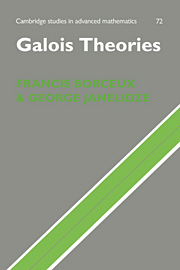Book contents
- Frontmatter
- Contents
- Preface
- 1 Classical Galois theory
- 2 Galois theory of Grothendieck
- 3 Infinitary Galois theory
- 4 Categorical Galois theory of commutative rings
- 5 Categorical Galois theorem and factorization systems
- 6 Covering maps
- 7 Non-galoisian Galois theory
- Appendix: Final remarks
- Bibliography
- Index of symbols
- General index
Preface
Published online by Cambridge University Press: 11 January 2010
- Frontmatter
- Contents
- Preface
- 1 Classical Galois theory
- 2 Galois theory of Grothendieck
- 3 Infinitary Galois theory
- 4 Categorical Galois theory of commutative rings
- 5 Categorical Galois theorem and factorization systems
- 6 Covering maps
- 7 Non-galoisian Galois theory
- Appendix: Final remarks
- Bibliography
- Index of symbols
- General index
Summary
E. Galois (1811–1832) would certainly be surprised to see how often his name is mentioned in the mathematical books and articles of the twentieth century, in topics which are so far from his original work.
Since antiquity, mathematicians have been able to solve polynomial equations of degree 1 or 2. Formulæ for solving the equations of degree 3 or 4 were found during the sixteenth century. But it was only during the nineteenth century that the problem of equations of higher degree reached a final answer: the impossibility of solving by radicals a general equation of degree at least 5, and some methods for finding some solutions by radicals when these exist. Galois and Abel certainly played a key role in the development of this theory. All these results can be found in almost every book on Galois theory … and that's the reason why we considered it useless to present them once more in the present book.
A strong peculiarity of those developments about solving equations is that the methods used to reach the final goal proved to be much more interesting than the problem to be solved. Nobody uses the formulæ for solving cubic or quartic equations … but their consideration forced the discovery of complex numbers. And the impossibility proof for equations of higher degree led to specifying the notion of group, on the interest of which it is unnecessary to comment.
Let us now sketch, in modern language, the central result used by Galois to prove his celebrated theorem.
- Type
- Chapter
- Information
- Galois Theories , pp. vii - xivPublisher: Cambridge University PressPrint publication year: 2001



